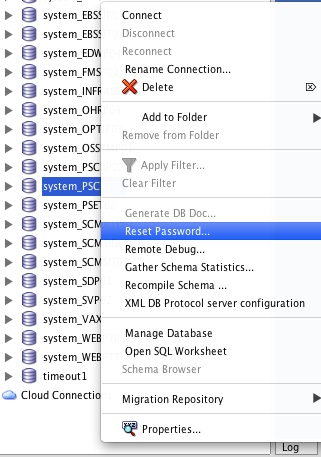Recently Oracle
announced a new Oracle Instant Client for OSX. As always
there is a 32-bit and a 64-bit version available.
I was curious if they can be merged together to an universal binary. The short answer: yes, they can.
It all starts with downloading the instant client zips for 32 and 64 binary. I loaded basic and sqlplus and unzipped them into 2 directories instantclient_11_2_32 and instantclient_11_2_64. I also created a target directory instantclient_11_2.
Then the simple script
for i in `ls instantclient_11_2_32`
do
lipo -create ~/instantclient_11_2_{32,64}/$i -output ~/instantclient_11_2/$i || cp ~/instantclient_11_2_64/$i ~/instantclient_11_2/$i
done
did the work with this output:
lipo: can't figure out the architecture type of: /Users/berx/instantclient_11_2_32/BASIC_README
lipo: can't figure out the architecture type of: /Users/berx/instantclient_11_2_32/SQLPLUS_README
lipo: can't figure out the architecture type of: /Users/berx/instantclient_11_2_32/glogin.sql
lipo: can't figure out the architecture type of: /Users/berx/instantclient_11_2_32/ojdbc5.jar
lipo: can't figure out the architecture type of: /Users/berx/instantclient_11_2_32/ojdbc6.jar
lipo: can't figure out the architecture type of: /Users/berx/instantclient_11_2_32/xstreams.jar
here what a simple file * shows:
BASIC_README: ASCII text
SQLPLUS_README: ASCII text
adrci: Mach-O universal binary with 2 architectures
adrci (for architecture i386): Mach-O executable i386
adrci (for architecture x86_64): Mach-O 64-bit executable x86_64
genezi: Mach-O universal binary with 2 architectures
genezi (for architecture i386): Mach-O executable i386
genezi (for architecture x86_64): Mach-O 64-bit executable x86_64
glogin.sql: ASCII English text
libclntsh.dylib.11.1: Mach-O universal binary with 2 architectures
libclntsh.dylib.11.1 (for architecture i386): Mach-O dynamically linked shared library i386
libclntsh.dylib.11.1 (for architecture x86_64): Mach-O 64-bit dynamically linked shared library x86_64
libnnz11.dylib: Mach-O universal binary with 2 architectures
libnnz11.dylib (for architecture i386): Mach-O dynamically linked shared library i386
libnnz11.dylib (for architecture x86_64): Mach-O 64-bit dynamically linked shared library x86_64
libocci.dylib.11.1: Mach-O universal binary with 2 architectures
libocci.dylib.11.1 (for architecture i386): Mach-O dynamically linked shared library i386
libocci.dylib.11.1 (for architecture x86_64): Mach-O 64-bit dynamically linked shared library x86_64
libociei.dylib: Mach-O universal binary with 2 architectures
libociei.dylib (for architecture i386): Mach-O bundle i386
libociei.dylib (for architecture x86_64): Mach-O 64-bit bundle x86_64
libocijdbc11.dylib: Mach-O universal binary with 2 architectures
libocijdbc11.dylib (for architecture i386): Mach-O bundle i386
libocijdbc11.dylib (for architecture x86_64): Mach-O 64-bit bundle x86_64
libsqlplus.dylib: Mach-O universal binary with 2 architectures
libsqlplus.dylib (for architecture i386): Mach-O dynamically linked shared library i386
libsqlplus.dylib (for architecture x86_64): Mach-O 64-bit dynamically linked shared library x86_64
libsqlplusic.dylib: Mach-O universal binary with 2 architectures
libsqlplusic.dylib (for architecture i386): Mach-O bundle i386
libsqlplusic.dylib (for architecture x86_64): Mach-O 64-bit bundle x86_64
ojdbc5.jar: Zip archive data, at least v1.0 to extract
ojdbc6.jar: Zip archive data, at least v1.0 to extract
sqlplus: Mach-O universal binary with 2 architectures
sqlplus (for architecture i386): Mach-O executable i386
sqlplus (for architecture x86_64): Mach-O 64-bit executable x86_64
uidrvci: Mach-O universal binary with 2 architectures
uidrvci (for architecture i386): Mach-O executable i386
uidrvci (for architecture x86_64): Mach-O 64-bit executable x86_64
xstreams.jar: Zip archive data, at least v1.0 to extract
Ok, now all the files are merged (or just copied) together.
Now let's check if 32 and 64 bit works.
I need this environment set:
export DYLD_LIBRARY_PATH=/Users/berx/instantclient_11_2
export PATH=$PATH:/Users/berx/instantclient_11_2
So let's thy the 32 bit version:
arch -arch i386 ./sqlplus
SQL*Plus: Release 11.2.0.3.0 Production on Fri Feb 15 11:22:46 2013
Copyright (c) 1982, 2012, Oracle. All rights reserved.
Enter user-name:
It looks good, just let's check if it's really running at 32 bit. Activity Monitor helps:

And the same thing for 64 bit:
arch -arch x86_64 sqlplus
SQL*Plus: Release 11.2.0.3.0 Production on Fri Feb 15 11:38:23 2013
Copyright (c) 1982, 2012, Oracle. All rights reserved.
Enter user-name:

So this can be seen as a short example how we can use only one ORACLE_HOME for 32
and 64 bit binaries on OSX.
But as always there is the usual disclaimer: It's not supported by Oracle; never do it on a production system (who is running anything Oracle-Related on OSX Server at all?); it's not tested with all the different applications which use oracle client.
Update 1 (2012-02-17 21:50):
If you want the binary installation more like a real ORACLE_HOME check
Ronald Roods blog!


